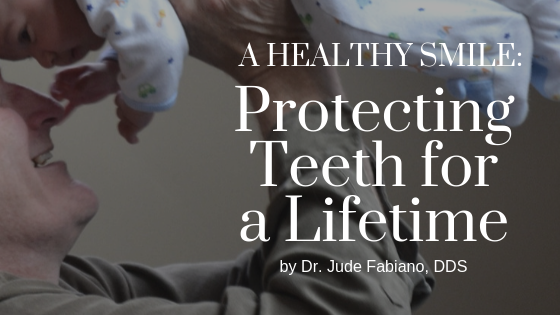When you look at a smiling face, what do you see? Maybe it’s the joy in their eyes and the crinkle on their nose that signifies true joy. All the times we smile throughout the day should also be a reminder of how important it is to keep our teeth healthy.
Your teeth are protected by enamel, a hard white substance made of 90% hydroxyapatite. When holes or structural damage occur in the enamel and underlying dentin, it can cause a toothache, hypersensitivity and additional damage. Your enamel doesn’t naturally regenerate if it is damaged. This is why it’s so vital to start dental care early.
Protecting Teeth Through the Ages
An important part of maintaining oral health is to be vigilant about regular dental care throughout a person’s lifetime.
Infants
Tooth enamel is formed before teeth even emerge through the gum line. In fact, a baby’s molars begin forming halfway through a pregnancy. Although kids aren’t expected to see a dentist until their first teeth emerge, it’s important to care for children’s teeth from a very young age. You should use a soft-bristled toothbrush with a small head designed for infants. Doing this before bedtime will remove plaque bacteria that leads to decay.
Generally speaking, a baby’s first visit to the dentist should be no later than his or her first birthday. From then on, check-ups should follow every six months. This not only ensures that their teeth are healthy, but also creates an opportunity for children to become comfortable in the dentist office. Furthermore, it instills the mindset that dental health is a priority to maintain over the years.
Children
Some parents have the misconception that the health of their children’s primary, or “baby,” teeth is less important because they will eventually fall out and be replaced. However, this couldn’t be further from the truth. Primary teeth help children to speak clearly, chew naturally and also form a path for permanent teeth to follow. Tooth decay doesn’t disappear when baby teeth fall out. Unless decay is addressed in early stages, children are at risk for tooth loss and infection of the gums.
In addition to visiting the dentist regularly, children should have a daily routine focused on dental health. The general rule of thumb is to brush their teeth for 2 minutes once in the morning and once at night. Using a small amount of fluoride toothpaste on a soft-bristled brush is most effective. Until the child is old enough to properly brush on their own, parents should be responsible for ensuring that their teeth are cleaned properly and are taught the proper methods.
Pro tip: Make it fun! Get your children a toothbrush with their favorite cartoon character on it, or one that plays a catchy tune. When your children look forward to brushing their teeth, it will make your job much easier. As your children progress into their teenage years, be sure that you remind them of their oral health and keep scheduling regular dentist visits to maintain their healthy smiles.
Adults
By adulthood, brushing regularly is generally second nature. At night because it’s part of your routine, and in the morning as a courtesy to your co-workers. However, according to data from 2016, only 64.4% of adults aged 18-64 had visited the dentist in the past year. When insurance obstacles and work obligations make dental visits a nuisance, some adults aren’t as vigilant about regular dental visits.
The importance of dental health should never be pushed to the back burner. Inflammation and infection in your mouth have the potential to spread to other areas of the body. Dental pain can lead to difficulty eating, and gum disease has been linked to heart disease, type II diabetes, and possibly certain cancers.
Older Adults
According to the CDC, 1 in 5 adults aged 65 and older have untreated tooth decay. Most older adults in the U.S. take both over-the-counter and prescription medications that cause dry mouth as a side effect. While the medications are necessary to manage other health problems, the subsequent decreased flow of saliva increases the risk of cavities.
Many older adults also didn’t grow up learning what we know today about oral health care, so it isn’t a top priority to visit the dentist regularly. More and more people are keeping their natural teeth longer, but many older adults have dentures that require special care of their own.
General Tips for Healthy Teeth
In addition to regular dental visits and a daily routine, people of all ages should also be conscious of what and when they eat.
Acidic foods are known to erode your teeth’s precious enamel, which could eventually cause damage to the underlying surface. When you eat acidic foods, it’s recommended to rinse your mouth with water afterward to minimize the acidity’s impact. The same is true for any foods high in sugar.
Additionally, children and adults alike should avoid eating immediately before bedtime. Even drinking anything besides water can undo the reason for brushing before bedtime.
For more specific information about dental health for you, your children or your parents, talk to your dentist or healthcare professional. They can provide you with resources and information to keep your teeth in good health and help you maintain the smiling face.

